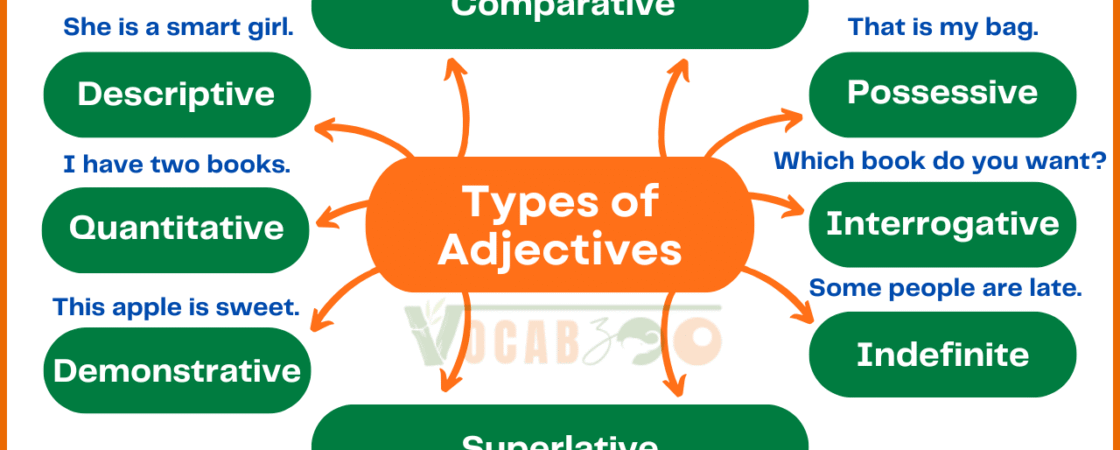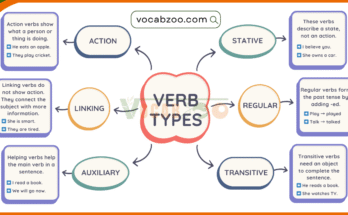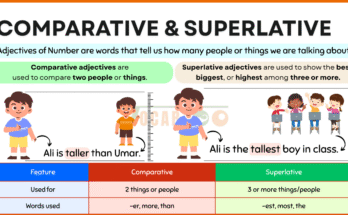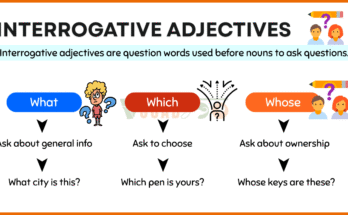Do you want to make your sentences more clear and descriptive? Then you need to learn adjectives. In this blog post, you will understand what adjectives are, explore their types, and see simple examples that will help you speak and write better English.
Let’s start learning in a simple and easy way!
What is an Adjective?
An adjective is a word that describes a noun or pronoun. It tells us more about a person, place, or thing.
Adjectives give more detail to your sentence.
Example:
- Ali is a kind boy.
- She has a red dress.
- We saw a beautiful bird.
Remember: Adjectives usually answer these questions:
- What kind? (happy, small, tall)
- How many? (two, many, some)
- Which one? (this, that, those)
Types of Adjectives Chart
| Type | Use | Example |
|---|---|---|
| Descriptive | Shows quality or color | She is a smart girl. |
| Quantitative | Tells how much or how many | I have two books. |
| Demonstrative | Points out a specific thing | This apple is sweet. |
| Possessive | Shows ownership | That is my bag. |
| Interrogative | Used in questions | Which book do you want? |
| Indefinite | Doesn’t show exact amount | Some people are late. |
| Comparative | Compares two things | He is taller than me. |
| Superlative | Compares more than two things | She is the smartest in class. |
Adjective Words by Category
| Category | Adjective Examples |
|---|---|
| Size | small, big, large, tiny, huge, short, tall, giant, little |
| Texture | smooth, rough, soft, hard, silky, bumpy, sticky, fluffy |
| Shape | round, square, flat, oval, straight, curved, thin, wide |
| Feelings | happy, sad, angry, scared, excited, nervous, tired, proud |
| Time | early, late, old, new, ancient, modern, recent, young |
| Age | young, old, teenage, middle-aged, newborn, elderly |
| Color | red, blue, green, yellow, black, white, pink, orange, brown |
| Quantity | few, many, several, all, some, two, most, enough |
| Condition | clean, dirty, broken, damaged, fresh, healthy, sick |
| Opinion | good, bad, excellent, poor, amazing, boring, fun, terrible |
| Speed | fast, slow, quick, rapid, steady |
| Temperature | hot, cold, warm, cool, freezing, boiling |
| Distance | far, near, close, long, short |
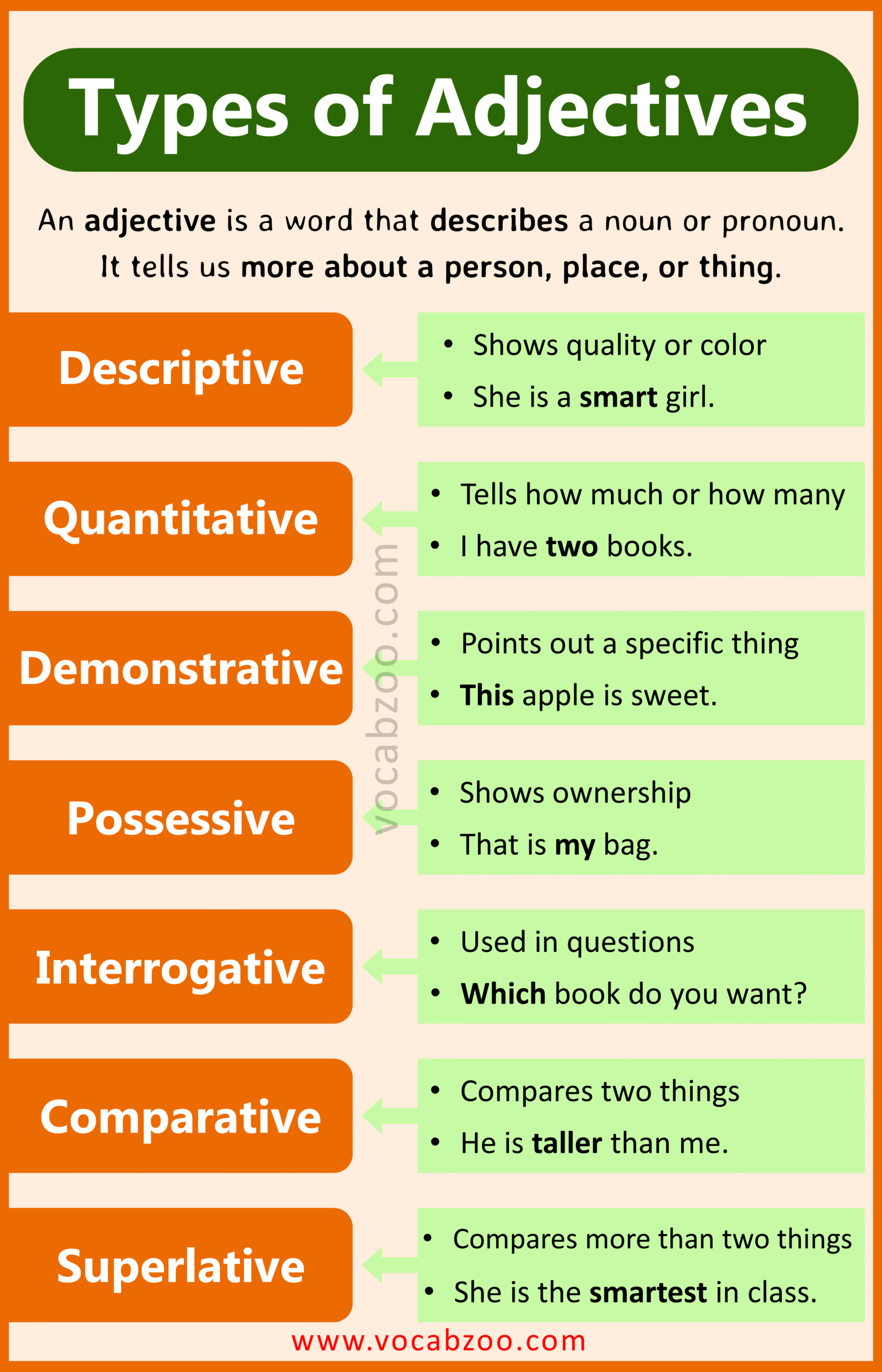
Adjectives and Their Types with Examples
Here is a short and easy explanation of each type of adjective with a list of words and example sentences.
1. Descriptive Adjectives
What they do: They describe the quality, shape, color, or size of a noun.
Common Words:
tall, short, red, cold, happy, beautiful, round, smart
Example Sentences:
- The tall boy won the race.
- She has a red car.
- It was a cold morning.
2. Quantitative Adjectives
What they do: They tell us how much or how many.
Common Words:
some, much, many, few, little, all, several, enough, two
Example Sentences:
- I have two brothers.
- She drank some water.
- We need more chairs.
3. Demonstrative Adjectives
What they do: They point out specific people or things.
Common Words:
this, that, these, those
Example Sentences:
- I like this shirt.
- Those apples are sweet.
- Take that bag, please.
4. Possessive Adjectives
What they do: They show ownership or belonging.
Common Words:
my, your, his, her, its, our, their
Example Sentences:
- That is my book.
- We love our school.
- Her dress is new.
5. Interrogative Adjectives
What they do: Used to ask questions about nouns.
Common Words:
which, what, whose
Example Sentences:
- Which subject do you like?
- Whose pen is this?
- What time is it?
6. Indefinite Adjectives
What they do: They do not show exact amount or number.
Common Words:
some, any, few, many, much, several, each, every
Example Sentences:
- Many students were present.
- We have some work to do.
- Each child got a gift.
7. Comparative Adjectives
What they do: Used to compare two nouns.
Common Words:
taller, smarter, bigger, better, more useful
Example Sentences:
- She is smarter than her brother.
- This road is wider than that one.
- My phone is better than yours.
8. Superlative Adjectives
What they do: Used to compare more than two nouns.
Common Words:
tallest, smartest, biggest, best, most useful
Example Sentences:
- He is the tallest in the class.
- That was the best movie I saw.
- This is the most beautiful place.
Adjectives in Different Contexts
In Front of Nouns:
- He has a blue car.
- They live in a big house.
After Verbs (like is, are, was):
- The baby is cute.
- Her idea was brilliant.
With Comparative & Superlative Forms:
- This movie is better than that one.
- Mount Everest is the highest mountain.
Quick Summary for Types of Adjectives
| Type | Function | Examples |
|---|---|---|
| Descriptive | Shows quality, size, color | happy, round, blue |
| Quantitative | Shows amount or number | some, many, two |
| Demonstrative | Points to something | this, those |
| Possessive | Shows belonging | my, her, their |
| Interrogative | Used in questions | which, whose |
| Indefinite | Not specific in number | few, every, several |
| Comparative | Compares two things | taller, more helpful |
| Superlative | Compares more than two things | best, most useful |
Quick Adjective Tips for Beginners
- Always place descriptive adjectives before nouns.
- Use comparative form to compare two things.
- Use superlative form to compare three or more.
- Adjectives do not change form for plural nouns.
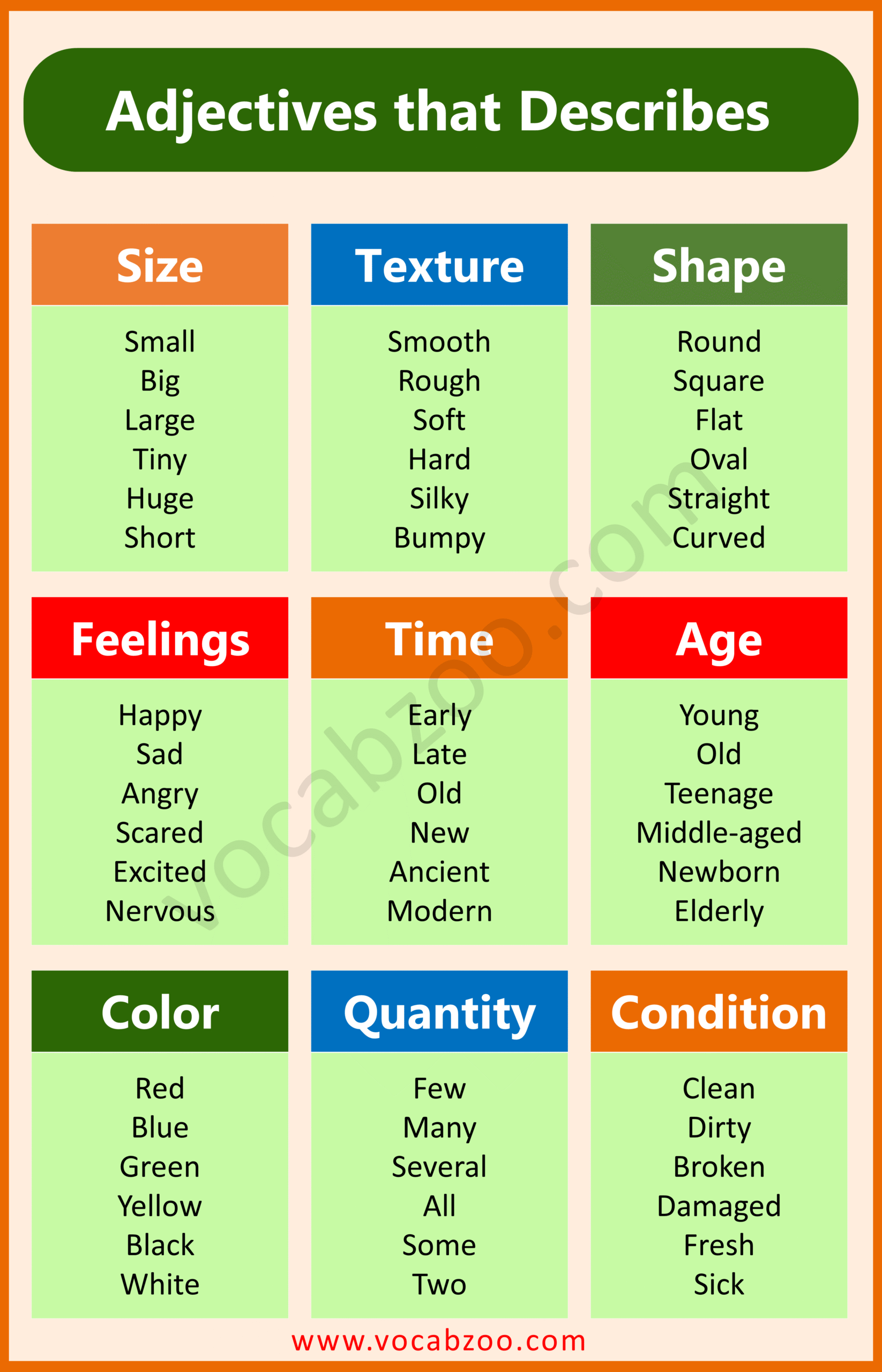
Adjectives help you make your English sentences stronger and clearer. They describe people, things, places, and feelings in a better way. Now that you know the types and examples, start using them in your daily conversation.
Keep practicing, and soon you will speak English with more confidence and style!
Read More
